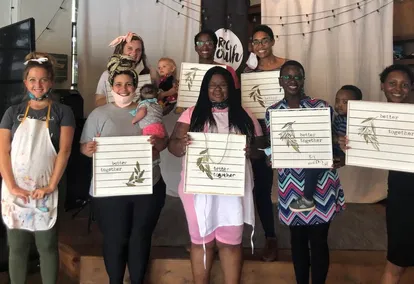
Tenesha Thomas’s ministry has a concise mission: To equip people with essential skills to improve their lives. What that looks like is a moving target, due largely to circumstances outside her control.
“We’re in the middle of an active pivot,” said Thomas, who leads one of the 186 Christian Women’s and Men’s Job Corps sites in the United States and abroad.
Woman’s Missionary Union started the ministry 25 years ago to provide spiritual development, job training, life skills, continuing education and mentoring.
As it celebrates a milestone anniversary, CWJC/CMJC is at a crossroads in many communities, including Huntsville, Alabama. Changing ideas about work and the rise of technology have created challenges for her group, Thomas said. The ongoing COVID-19 pandemic and resulting “great resignation” have led more people to question the meaning of work and in some cases, to leave it altogether.
But Thomas speaks optimistically of the blessings to be found in the hardships of this season. She and her team have had a chance to look afresh at their community.
“A lot of their needs have changed,” she noted, “and that’s a direct reflection of where we are in the world right now.”
All things to all people
The ultimate goal of CWJC/CMJC is to provide a Christian context for people to move from one place in life to another, said Lena Kappen, whose role at WMU includes serving as national coordinator for the ministry, “and to give them a hope for the future. After that, the individual sites reflect the specific needs in their communities.”
“One of the beautiful things about the ministry is that every site looks different,” she added.
WMU provides resources and training for the autonomous, self-supporting sites, each of which certifies with the national organization every two years.
“Our desire is for sites to form and evaluate over time with the purpose of meeting the current needs that are in the community,” Kappen said, “meeting the needs that aren’t being met in other ways.”
Every site has connections with members of local congregations, and some are housed inside a church. Others formed within local Baptist associations, and some sites are 501(c)(3) organizations.
“I always tell someone if they’ve felt like the Lord is leading them to start something like this, just follow that lead,” Kappen said, “and the Lord will show them what it needs to look like.”
Restoration Women
In Athens, Georgia, Jessica Mathisen was looking for a way to help the families she met as a teacher at an inner city elementary school. Christian Women’s Job Corps was the answer. The Athens site, named Restoration Women, started serving women in the spring of 2020, meeting regularly for sessions on budgeting, relationships, self-image, parenting and a variety of other topics. Last semester’s Bible study was a walk through Scripture from Genesis to Revelation.
One early participant was struggling with job satisfaction, Mathisen recalled. She now works to engage others in community involvement and improvement. Another student started saving for her first home after attending a budgeting class.
“The biggest thing that we want is for women to be restored to who they were created to be in Christ,” Mathisen said. “We feel like that would have a domino effect.
“When women are set free, when they are being poured into, when they know that they matter, that changes everything about their family’s dynamics.”
Season of change
Fluidity is key, Thomas noted, especially when circumstances constantly change. Over the past year her site in Huntsville has focused on reconnecting with past participants through a series of workshops that also operate like an open house for the community, she said. They also launched a men’s program in 2020.
Thomas calls it a “pulse check” — the process of determining what people in the community really need. One recent discovery has been their role in helping people gain certification for employment or job advancement. As participants go through a certification process, Thomas’s site also pairs them with mentors in their specific discipline.
But not everyone is looking for a job, she acknowledged.
“Some people are just looking for a change, and they don’t know where to start.”
The ministry’s goal is to be a catalyst to ignite that change, Thomas said. It’s a season of excitement mixed with a bit of uncertainty.
“We don’t want to just be in the community — we want to be effective in the community,” she asserted. “If we only serve one person, that’s going to be the most poured-into, loved-on person ever. Because that’s what it’s all about.”
by Meredith Flynn